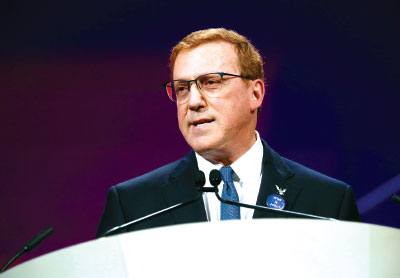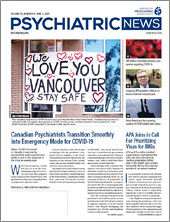At an extraordinary moment in history and in the midst of a global pandemic, APA remains strong and determined to fulfill its mission of advocating for psychiatrists and their patients, said APA CEO and Medical Director Saul Levin, M.D., M.P.A., in an address launching the virtual APA Spring Highlights Meeting in late April.
“Despite the challenges of the COVID-19 crisis, I want to assure you all that APA is strong, our membership is strong, our administration is strong,” Levin said.
New York City had been the hottest of the nation’s COVID-19 hotspots, and Levin specifically raised up the New York State Psychiatric Association and its leadership “as a shining example of how we should respond to a crisis.”
Levin said, “They are showing that we are physicians first, with an expertise in psychiatry. As members of the House of Medicine, we must step up and aid in ending this crisis any way we can add value.”
Levin also used the occasion to emphasize that health care professionals should not have to supply their personal protective equipment. “The responsibility of ensuring the safety of staff must come from the hospital systems and state and federal governments.
“I want to thank every person working to end the pandemic—the most significant public health emergency of our lifetimes,” he said.
Looking ahead, Levin said that the APA leadership and administration are working to make the most of new opportunities and “make history” in the coming decade. He reminded meeting attendees of APA’s recent and ongoing projects and accomplishments:
•
With funding from the Substance Abuse and Mental Health Services Administration, APA last year launched a national center of excellence for all clinicians treating patients with serious mental illness (SMI) called SMI Adviser. To date, this innovative initiative has provided free education to more than 15,000 clinicians treating patients with SMI.
•
APA has made progress in moving the bipartisan Mental Health Parity Compliance Act in Congress. The legislation requires insurers to “show their work” and demonstrate how their practices comply with federal parity requirements. The bill is positioned for possible enactment this year.
•
Arizona became the eighth state to enact APA’s model law requiring insurers to comply with parity law requirements (see
Psychiatric News). The legislation has been introduced in 15 other states.
•
Illinois became the first state to sign into law APA-drafted legislation that requires private insurers in Illinois and Illinois Medicaid to cover Collaborative Care CPT codes. Several other state Medicaid agencies have agreed to accept the codes as well.
•
The “Group of Six” (APA, the American Academy of Family Physicians, American College of Physicians, American College of Obstetricians and Gynecologists, American Academy of Pediatrics, and American Osteopathic Association) is reaping victories in Congress while demonstrating to lawmakers that mental and substance use services are crucial components of American health care.
APA’s virtual Spring Highlights Meeting was created after it was determined that APA could not hold its 2020 Annual Meeting due to the COVID-19 pandemic. Levin noted that since APA’s founding in 1844, the meeting had been suspended only twice before—during the Civil War and World War II.
For now, he said that APA will continue to hold meetings virtually as an organization through the end of the year. “At that time, we will reassess the status of COVID-19,” he said. “We hope we can gather in person for a full APA Annual Meeting in Los Angeles in 2021.” ■

